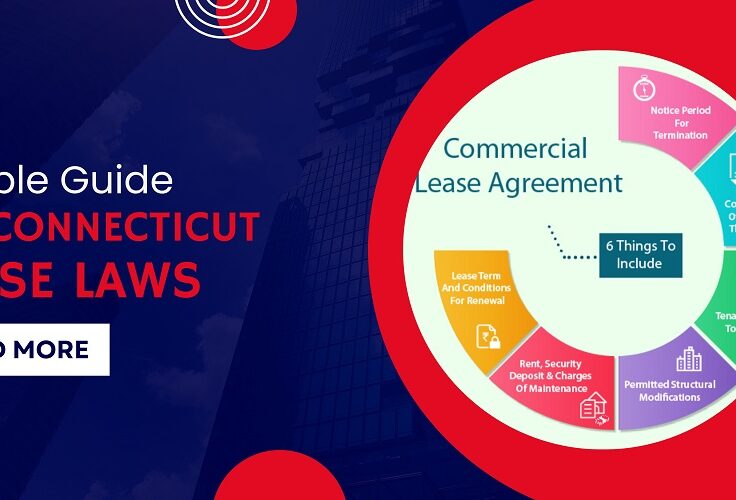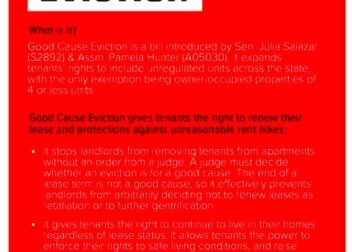A Comprehensive Guide to Connecticut Commercial Lease Laws
When it comes to commercial leases in Connecticut it’s crucial to get a handle on the fundamentals. Having been through this process I can assure you that having a grasp of these laws can greatly impact the overall leasing experience. The commercial lease laws in Connecticut encompass various aspects ranging from outlining the terms of the lease to addressing conflicts and responsibilities. It’s not merely about putting your signature on the contract; it’s about comprehending what you are committing to. By acquainting yourself with these regulations you will be more prepared to make choices and safeguard your interests.
Key Terms in Connecticut Commercial Leases
Commercial leases can be filled with language and intricate clauses that may appear intimidating at first. Here’s a straightforward overview of important terms to pay attention to.
- Lease Term: This defines the length of time the lease is valid. It could range from a few months to several years.
- Rent: This specifies how much you need to pay, when it’s due, and how increases, if any, will be handled.
- Security Deposit: A sum of money paid upfront to cover potential damages or unpaid rent.
- Use Clause: Details what the leased property can be used for, which can be crucial if you have specific business needs.
- Maintenance Responsibilities: Outlines who is responsible for repairs and upkeep of the property.
Based on what I’ve seen its important to carefully review these terms and seek clarification if anything is unclear. Its wiser to address any questions before signing rather than encountering unexpected issues down the line.
Rights and Responsibilities of Tenants
If you’re renting a place in Connecticut you have certain rights and obligations outlined in your commercial lease contract. Let’s take a closer look at them.
- Right to Quiet Enjoyment: You have the right to use the property without unnecessary disturbances. If the landlord fails to maintain the property or interferes with your business, you may have grounds for complaint.
- Responsibility for Rent Payments: Timely payment of rent is crucial. Failure to pay rent on time can lead to legal action or eviction.
- Maintenance and Repairs: Depending on your lease agreement, you might be responsible for minor repairs and maintenance. However, major repairs are typically the landlord’s responsibility.
- Compliance with Laws: You must adhere to local zoning laws and building codes. Running a business that violates these regulations can lead to legal trouble.
Maintaining an dialogue with your landlord and keeping a record of all arrangements and concerns is crucial. Based on my personal experience having well documented records and a good grasp of your rights can prevent many future hassles.
Landlord Obligations in Connecticut
As I navigate through different commercial leases I’ve come to realize that grasping a landlords responsibilities can greatly impact your leasing journey. In Connecticut landlords are expected to fulfill certain duties to ensure that the property is fit for business activities. This goes beyond keeping a roof over your head; it also entails making sure that the property is secure and operational.
- Maintenance and Repairs: Landlords must keep the property in a condition that complies with local building and health codes. This means handling major repairs, like fixing broken HVAC systems or addressing structural issues, falls squarely on their shoulders.
- Safe and Habitable Conditions: The property should be free from hazards and in a condition that is suitable for the intended business use. For instance, if you’re operating a food business, the landlord should ensure the premises meet health and safety regulations.
- Respecting Lease Terms: Landlords must adhere to the terms outlined in the lease agreement. If the lease specifies certain improvements or maintenance tasks, they need to follow through.
- Quiet Enjoyment: This is a legal term meaning that landlords cannot interfere with your use of the property. They must allow you to conduct your business without unwarranted interruptions.
Based on what I’ve seen clear communication with your landlord regarding these responsibilities can help avoid any misinterpretations. It’s important to keep a record of any problems that arise and to follow up in a timely manner to ensure they are resolved.
Lease Agreement Clauses to Watch Out For
Entering into a commercial lease is akin to engaging in a choreography of terms and stipulations. While certain provisions in the lease contract may appear simple they can hold considerable weight. Here are some key aspects to be mindful of drawn from my personal encounters;
- Rent Escalation Clauses: These clauses allow the landlord to increase the rent periodically. Understanding how and when these increases will occur can help you budget better.
- Termination Clauses: Check the terms under which you or the landlord can terminate the lease. Unfavorable terms here can leave you with little control over the future of your lease.
- Renewal Options: See if you have the option to renew the lease and under what conditions. This can be critical if you plan to stay long-term.
- Subletting and Assignment: If you anticipate needing to transfer the lease to another party, ensure the lease allows for subletting or assignment and understand any restrictions.
- Insurance Requirements: Often, leases require tenants to carry specific types of insurance. Ensure you understand these requirements to avoid any unexpected costs.
By examining these provisions thoroughly and seeking advice from a professional, you can steer clear of potential issues. Believe me, investing time in this process from the outset will spare you considerable hassle down the road.
How to Handle Lease Disputes
Disagreements can be compared to surprise visitors they may not be desired but are occasionally inevitable. I’ve encountered my share of conflicts while leasing and dealing with them efficiently is essential for keeping things running smoothly. Here’s a practical way to navigate lease disputes.
- Document Everything: Keep detailed records of all communications and agreements. This documentation can be invaluable if disputes escalate.
- Communicate Clearly: Approach the issue calmly and directly with the other party. Often, a straightforward conversation can resolve misunderstandings.
- Review the Lease Agreement: Go back to the lease terms and see what they say about resolving disputes. Many leases include a dispute resolution process.
- Seek Mediation: If direct communication doesn’t work, consider mediation. A neutral third party can help facilitate a resolution without going to court.
- Legal Action: As a last resort, you may need to consult with an attorney and consider legal action. This can be time-consuming and costly, so it’s best used when other methods fail.
Resolving conflicts efficiently calls for a calm demeanor and a composed mindset. Based on my previous encounters I’ve discovered that prioritizing finding a solution instead of dwelling on the disagreement contributes to maintaining a work environment.
Legal Remedies for Lease Violations
Lease violations can throw a spanner in the works disrupting what was meant to be a seamless business operation. Based on my experiences handling these matters swiftly and efficiently is essential for preserving your peace of mind and ensuring the smooth running of your business. In Connecticut if either party neglects to fulfill their obligations under the lease agreement there are various legal options available to rectify these breaches.
- Demand for Cure: Often, the first step is issuing a formal demand for the party in violation to correct the issue. This written notice should clearly specify the breach and the timeframe for rectification.
- Withholding Rent: In certain situations, tenants may withhold rent if the landlord fails to provide essential services or maintain the property as required. However, this should be done cautiously and in accordance with legal guidelines to avoid further complications.
- Seeking Injunctive Relief: If a violation is causing immediate harm and requires urgent action, you may seek a court order to compel the other party to comply with the lease terms.
- Termination of Lease: In severe cases of breach, terminating the lease might be the appropriate action. This involves legally ending the lease agreement due to significant violations.
- Legal Action for Damages: If you’ve suffered financial loss due to a lease violation, you can seek damages through a lawsuit. This process often involves proving the extent of the damage and the responsibility of the other party.
Having gone through this experience I can confirm that although there are legal options they should be viewed as a course of action. In many cases addressing concerns through dialogue and discussions can lead to resolutions without the necessity of involving the law.
Important Considerations When Negotiating a Lease
Negotiating a lease can be a bit of a tightrope walk. After going through it myself I’ve come to realize that entering lease talks with a well thought out plan and insight can greatly influence the trajectory of your business. Here are a few important factors to keep in mind that can really make a difference.
- Understand Your Needs: Before entering negotiations, clearly define what your business needs in terms of space, location, and lease terms. This helps you focus on what’s truly important and avoid settling for less.
- Flexibility in Lease Terms: Seek flexibility where possible. This could include options for renewing the lease, subletting, or adjusting the lease terms if your business grows or changes.
- Negotiate Rent and Costs: Don’t hesitate to negotiate the rent. Additionally, discuss any extra costs like maintenance fees or property taxes. Knowing these costs upfront can prevent surprises later.
- Get Everything in Writing: Ensure that all agreements and amendments are documented. Verbal agreements might be overlooked, but written terms provide clarity and security.
- Legal Advice: Engaging a lawyer to review the lease agreement can be invaluable. They can help spot any potentially problematic clauses and ensure that your interests are protected.
From my perspective being well prepared and communicating effectively during negotiations can lead to a lease that aligns perfectly with your business objectives. Its important to keep in mind that a solid lease can play a role in the success of your business.
Frequently Asked Questions
When it comes to dealing with leases there can be a lot of questions that come up. Drawing from my experiences and the insights of others I’ve gathered some frequently asked questions along with their responses to assist you in navigating this process.
- What should I do if I discover a lease violation? Document the violation and communicate with the landlord. Often, issues can be resolved through negotiation. If not, you may need to consider legal remedies.
- How can I negotiate a better lease rate? Research comparable rental rates in the area and use this information to justify your request. Be prepared to discuss the value of your business and any long-term commitments you can make.
- Can I modify a lease agreement once it’s signed? Modifications can be made if both parties agree. Always document any changes in writing to avoid misunderstandings.
- What are the consequences of breaking a lease? Breaking a lease can lead to legal and financial penalties, including losing your security deposit and possibly facing a lawsuit for damages. It’s crucial to review the lease terms and consult with a legal professional if you’re considering this route.
- How do I handle a dispute with my landlord? Start by discussing the issue directly with the landlord. If this doesn’t resolve the problem, consider mediation before escalating to legal action.
Taking a proactive and knowledgeable approach to lease inquiries can assist you in effectively managing your lease and steering clear of typical challenges. Based on my experiences tackling issues promptly can enhance your leasing journey.
Legal Remedies for Lease Violations
Lease breaches can disrupt your business activities causing unnecessary tension. Having encountered my fair share of lease problems I’ve realized that being aware of your legal options is vital for navigating these difficulties smoothly. In Connecticut the law offers various pathways to tackle lease violations and being knowledgeable about them can empower you to respond appropriately.
- Demand for Cure: This involves formally notifying the violating party of the issue and requesting they fix it. It’s often the first step in resolving disputes and shows your intent to address the problem amicably.
- Withholding Rent: If the landlord fails to maintain the property, tenants may withhold rent. However, this should be approached carefully and in compliance with the law to avoid further complications.
- Seeking Injunctive Relief: For urgent issues that need immediate resolution, you might seek a court order to compel compliance. This is typically used for severe breaches that affect your business operations directly.
- Termination of Lease: In cases of significant breaches, terminating the lease might be necessary. This option should be considered when other remedies have failed and the violation severely impacts your business.
- Legal Action for Damages: If you incur financial losses due to the breach, you can file a lawsuit for damages. This involves proving the breach and the resulting financial impact.
Based on what I’ve seen dealing with problems when they come up and looking into legal options can be beneficial for maintaining your business. Often being proactive and communicating effectively can settle conflicts without needing to escalate them further.
Important Considerations When Negotiating a Lease
Negotiating a lease can be quite a challenge. In my opinion taking a strategic approach can really make a difference. Here are a few things to think about based on my experiences and what I’ve noticed.
- Understand Your Business Needs: Before you start negotiating, clearly define what you need from the lease. This includes space requirements, location preferences, and any specific features that are crucial for your business.
- Seek Flexibility: Look for lease terms that offer flexibility, such as options for renewal or adjustments if your business needs change. Flexibility can be a lifesaver as your business evolves.
- Negotiate Costs: Don’t shy away from discussing rent and other costs. Knowing what’s negotiable and what’s not can help you secure better terms. Be aware of additional costs like maintenance or property taxes that might affect your overall budget.
- Get Everything in Writing: Verbal agreements can be forgotten or misinterpreted. Always ensure that all terms and conditions are documented and signed by both parties to avoid future disputes.
- Consult a Legal Expert: A lawyer with experience in commercial leases can be invaluable. They can help you understand complex terms and ensure that your interests are protected.
Through my experience negotiating leases I’ve come to realize the importance of being prepared and communicating effectively. If you enter negotiations with a plan in mind you’ll be in a position to succeed.
Frequently Asked Questions
Navigating lease contracts and breaches can bring up a lot of inquiries. From my experiences and observations here are responses to frequently asked questions that could assist in addressing your worries.
- What should I do if I discover a lease violation? Document the issue and discuss it with the landlord. Many problems can be resolved through direct communication. If necessary, follow the formal procedures outlined in the lease or seek legal advice.
- How can I negotiate a better lease rate? Research comparable rates in your area and use this data to support your negotiation. Highlight your business’s value and be open to discussing long-term commitments that might work in your favor.
- Can I modify a lease agreement once it’s signed? Yes, lease agreements can be modified if both parties agree. Ensure that any changes are documented in writing to avoid confusion later.
- What are the consequences of breaking a lease? Breaking a lease can lead to financial penalties and potential legal action. It’s important to review the lease terms carefully and consult with a legal professional if you’re considering this option.
- How do I handle a dispute with my landlord? Start with open communication and try to resolve the issue directly. If this doesn’t work, consider mediation before taking legal action. Keeping detailed records of all communications can be helpful.
Taking a proactive and knowledgeable stance when it comes to lease inquiries can assist you in navigating the intricacies of commercial leases more efficiently. Based on my personal encounters being prepared and well versed will result in a leasing process.


